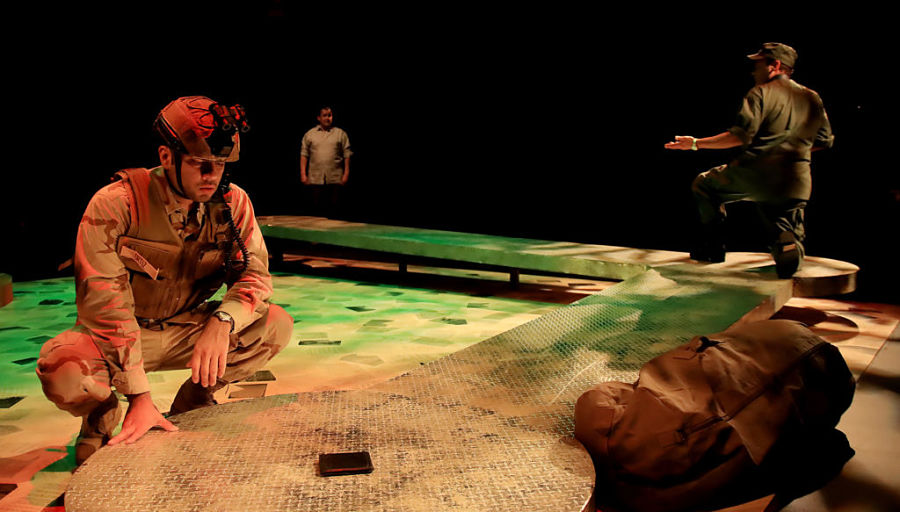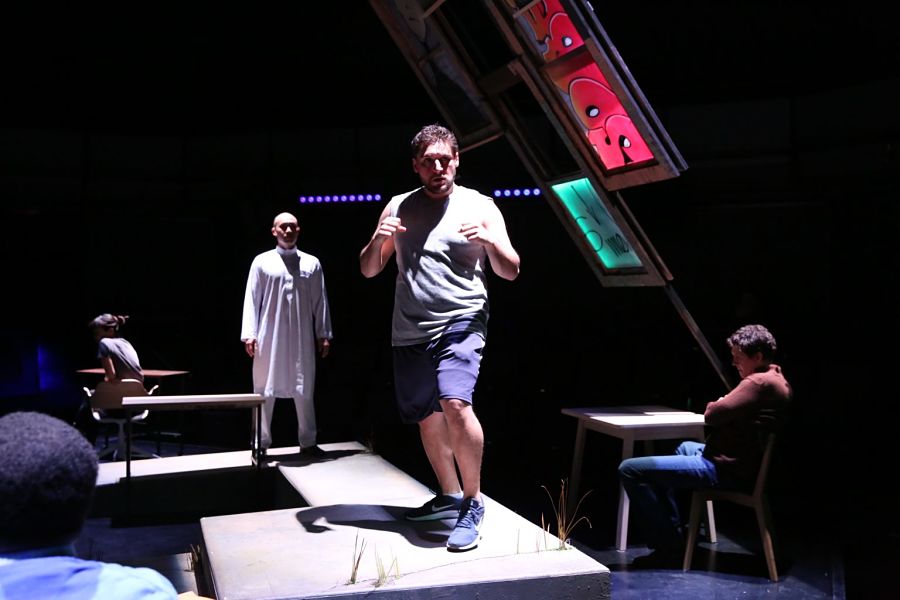The theatre community of Houston is in the final week of an ambitious undertaking: local premiere stagings of all of the plays in the Elliot Trilogy, Quiara Alegría Hudes’s triptych about war and addiction, in repertory at three different theatre companies across the city. Elliot, A Soldier’s Fugue began at Main Street Theater Feb. 8 and runs through March 1; Water by the Spoonful, winner of the 2012 Pulitzer Prize in Drama, ran at Stages Feb. 7-23, and The Happiest Song Plays Last will get a reading on March 6 by Mildred’s Umbrella Theater Company. These theatres vary greatly in size–Stages recently opened a $38.5 million theatre complex, while Mildred’s founder Jennifer Decker describes her own company as “really, really tiny”–illustrating how tight the bonds are within Houston’s professional theatre scene.
This is not the first time the trilogy has been performed in repertory; it was previously mounted simultaneously by Center Theatre Group and Latino Theater Company in Los Angeles, and last year it was done in overlapping rep by Teatro Paraguas, Ironweed Productions, and Santa Fe Playhouse in Santa Fe, New Mexico. But this trilateral staging of the Elliot cycle takes on extra meaning in a town that, despite having the nation’s fourth largest Hispanic/Latino population, has yet to host its own Latinx theatre company.
Kenn McLaughlin, artistic director of Stages, had this in mind when choosing Water by the Spoonful as the centerpiece for the third annual Sin Muros: A Latinx Theatre Festival. “Over time I sincerely hope to spawn a lot more opportunities–a platform–for Latinx artists to really be viable in the community, perhaps having their own company,” says McLaughlin. “The festival always has a Latinx anchor play, and so I really wanted a powerhouse of a play that has seen an enormous life in the country that we (Houston) haven’t seen yet.”
When Stages announced Water by the Spoonful as part of their season, the artistic directors of Main Street and Mildred’s Umbrella, Rebecca Udden and Jennifer Decker, stepped up with an idea they’d had before. “Even two years ago,” says Decker, “Becky at Main Street had been talking to me about the collaboration (on the Elliot cycle), but it didn’t happen right then. She saw Stages was doing it and she jumped in on that, and we were brought in after they had their conversation.”

All three directors were equally excited to introduce Hudes’s gripping work to Houston. “The trilogy to me is about human beings waking up every single day and putting their face into the world and having the courage to do that,” says McLaughlin. “Having the hope in your heart that there is healing and goodness through war and addiction and your career, that there are things that bind us everlasting: compassion, love, and possibility… I think that we need to be leaning into that story more than ever in the modern moment.”
Udden adds that the show allowed her to share a new perspective with her audiences. “We are a theatre whose history is tied up with the basic Western canon,” she says, “but I’m always trying to bring different voices into what we do, respectfully. I really feel like this is something that we can produce and not be appropriating something. It’s just so universal, and our audiences are loving it.”
Perhaps as significant as the productions themselves was the excuse for these three theatres to combine forces. For Mildred’s Umbrella in particular, this collaboration came at a crucial time. “We lost our space to developers in August,” Decker says. “Our lease was cancelled, we were all kicked out right in the middle of our season, and so the Alley Theatre let us do our last play, The Hunchback of Seville, in their smaller space in the two weeks that they’re dark.” Likewise the Elliot cycle allows Mildred’s name to reach a larger audience. “Any time a small group like mine is paired up with a bigger company, or two in this case, we get a lot of advertising and audience development that we wouldn’t normally get, so it’s been really good for us to be a part of this.”
McLaughlin and Udden were more than happy to sign on. If there is one quality that distinguishes Houston’s theatre scene from other cities, all three artistic leaders seem to agree, it would be unity. Udden put it clearly, “I’d say the key feature of Houston theatre is its collaborative nature, especially among the middle-tier and smaller companies. We’re all just in each others’ pockets all the time and sharing knowledge, sharing resources, and sharing people.”
Looking beyond Houston, McLaughlin sees collaboration as the wave of the future. “This ‘too big to fail’ model that the regional theatre has been founded on, I think it’s harmful to the system overall, and I think that those of us who continue to build up our audiences have to be mindful of how the whole is working,” McLaughlin says. “That’s where I work: How do we take and leverage the position that we have for the good of everyone in the system—the artist starting out, or the artist whose been in the system for a long period of time? How do we do that, and how do we make sure that all voices are getting some equity in the system?”
While theatremakers continue to grapple with these issues, one step seems obvious to Decker, McLaughlin, and Udden: Theatre companies should team up more often. For a series of plays centered so squarely on family and interdependence, the most valuable lessons about cooperation may be witnessed offstage.


